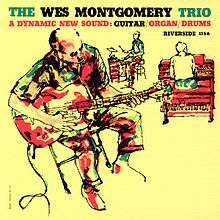The Wes Montgomery Trio
The Wes Montgomery Trio (a.k.a. A Dynamic New Sound) is an album by American jazz guitarist Wes Montgomery that was released in 1959. It was reissued by Original Jazz Classics. The track "Missile Blues" is named after the club in Indianapolis where Montgomery played before moving to New York City to record for Riverside. At this club he met record producer Orrin Keepnews.[1]
| The Wes Montgomery Trio | ||||
|---|---|---|---|---|
 | ||||
| Studio album by | ||||
| Released | 1959 | |||
| Recorded | October 5–6, 1959 | |||
| Studio | Reeves Sound Studios, New York City | |||
| Genre | Jazz | |||
| Length | 48:33 | |||
| Label | Riverside | |||
| Producer | Orrin Keepnews | |||
| Wes Montgomery chronology | ||||
| ||||
Reception
| Review scores | |
|---|---|
| Source | Rating |
| Allmusic | |
In his Allmusic review, music critic Ronnie D. Lankford, Jr. wrote of the album "The only drawback is that the accompaniment, which though solid, doesn't seem to perfectly match his guitar style... Montgomery's performance... was a revolution in technique and execution. Suddenly, out of nowhere, a 36-year-old guitarist re-imagines the jazz guitar solo."[2]
Track listing
- "'Round Midnight" (Thelonious Monk, Cootie Williams) – 4:58
- "Yesterdays" (Otto Harbach, Jerome Kern) – 3:20
- "The End of a Love Affair" (Edward Redding) – 3:18
- "Whisper Not" (Benny Golson) – 4:40
- "Ecaroh" (Horace Silver) – 3:00
- "Satin Doll" [Alternate take] (Duke Ellington, Johnny Mercer, Billy Strayhorn) – 4:08
- "Satin Doll" (Ellington, Mercer, Strayhorn) – 3:58
- "Missile Blues" [Alternate take] (Wes Montgomery) – 4:37
- "Missile Blues" (Montgomery) – 6:04
- "Too Late Now" (Burton Lane, Alan Jay Lerner) – 4:55
- "Jingles" (Montgomery) – 5:31
Tracks 6 & 8 do not appear on the original album.
Personnel
- Wes Montgomery – guitar
- Melvin Rhyne – organ
- Paul Parker – drums
Production notes:
- Orrin Keepnews – producer
- Jack Higgins – engineer
Session information
Cuts 1, 5, 6, 7, 8 recorded at Reeves Sound Studios, NYC, October 5, 1959
Cuts 2, 3, 4, 9, 10, 11 recorded at Reeves Sound Studios, NYC, October 6, 1959
Releases
Riverside CRLP 1156 (original album), Riverside RLP 12-310, Riverside OJCCD-034-2
References
- Woodard, Josef (1 July 2005). "Wes Montgomery: The Softer Side of Genius". JazzTimes. Retrieved 11 January 2019.
- Lankford, Jr., Ronnie D. "The Wes Montgomery Trio > Review". Allmusic. Retrieved July 31, 2011.